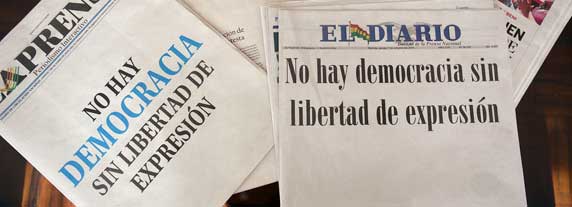
Reuters
Court and legislatures in the Americas have increasingly found that defamation should be a civil matter. Here are some key resources in support of free expression.
International conventions & declarations
- The Declaration of Principles on Freedom of Expression, adopted by the Inter-American Commission on Human Rights in 2000, asserts that criminal defamation laws violate freedom of expression guarantees and that public officials should be subject to greater scrutiny. http://www.cidh.oas.org/declaration.htm
- The Universal Declaration of Human Rights, adopted by the U.N. General Assembly in 1948, establishes in Article 19 that: “Everyone has the right to freedom of opinion and expression; this right includes freedom to hold opinions without interference and to seek, receive and impart information and ideas through any media and regardless of frontiers.” http://www.un.org/en/documents/udhr/index.shtml
- Adopted at the ninth international conference of American states, which also established the Organization of American States, the declaration on human rights establishes the right to freedom of expression in Article 4. http://www1.umn.edu/humanrts/oasinstr/zoas2dec.htm
- The American Convention on Human Rights, also known as the Pact of San José, took effect in 1978 and set the legal framework for human rights in the Inter-American system. http://www1.umn.edu/humanrts/oasinstr/zoas3con.htm
- A joint declaration by special rapporteurs for the United Nations, the Organization of American States, and the Organization for Co-Operation and Security in Europe called for slander and libel laws worldwide to be brought in line with international principles on freedom of expression. http://www.summit-americas.org/Human%20Rights/Freedom-Expression-1999.htm#JOINT DECLARATION
Jurisprudence
Inter-American system
- In a setback for free expression, the Inter-American Court of Human Rights in 2013 decided for the first time that a criminal sanction for defamation didn’t affect freedom of expression as established in Article 13 of the American Convention on Human Rights. The ruling involved Carlos and Pablo Mémoli, Argentine publishers of the newspaper La Libertad in San Andrés de Giles, a town in Buenos Aires province. http://www.corteidh.or.cr/docs/casos/articulos/seriec_265_esp.pdf
- The Inter-American Court of Human Rights overturned in 2004 a criminal defamation sentence imposed against Costa Rican journalist Mauricio Herrera Ulloa. http://www.corteidh.or.cr/docs/casos/articulos/seriec_107_ing.pdf
- The Inter-American Court of Human Rights ruled in 2004 that a criminal defamation conviction and prosecution against Paraguayan politician Ricardo Canese violated Article 13 of the American Convention on Human Rights. http://corteidh.or.cr/docs/casos/articulos/seriec_111_ing.pdf
- In 2005, the Inter-American Commission on Human Rights found in favor of journalist Chilean journalist Alejandra Matus, who faced criminal defamation charges stemming from her muckraking book about the Chilean judiciary. http://www.cidh.oas.org/annualrep/2005eng/Chile12142eng.htm
- CPJ’s 2001 amicus curiae brief in Matus case argued that that journalists should never face criminal liability for what they write, broadcast, or publish.http://cpj.org/news/2001/Chile_matus.pdf
United States
- The landmark 1964 US Supreme Court case, New York Times Co. v Sullivan, established the “actual malice” standard. To prevail in a defamation lawsuit, a public official must prove that a defendant knew a statement was false or acted in reckless disregard of the truth. http://caselaw.lp.findlaw.com/cgi-bin/getcase.pl?court=us&vol=376&invol=254
- In its 1966 decision in Ashton v Kentucky, the Supreme Court struck down the state’s criminal defamation law as unconstitutional. A milestone in U.S. case law, the ruling led other states to repeal similar laws. http://caselaw.lp.findlaw.com/scripts/getcase.pl?navby=search&court=US&case=/us/384/195.html
- In Gertz v Welch, the Supreme Court found there is “no such thing as a false idea.” Its 1974 ruling made it more difficult for private figures involved in public matters to pursue libel actions. http://caselaw.lp.findlaw.com/scripts/getcase.pl?court=US&vol=418&invol=323
National Laws
- MediaLaws Database hosts the International Press Institute’s (IPI) work on legal reform. IPI’s work under this program has focused primarily on defamation laws in Europe and the Caribbean. http://legaldb.freemedia.at/about/